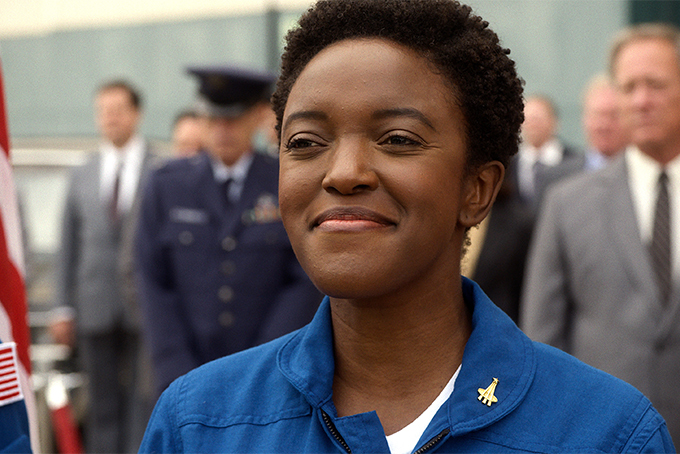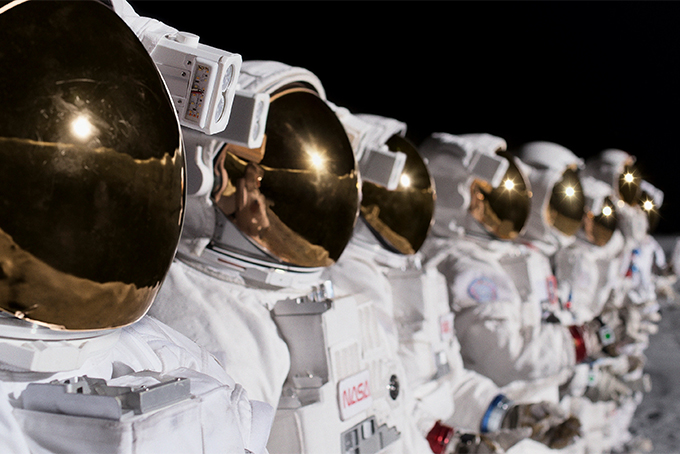Imagine a world where the space race never ended. Where the Soviet Union put boots on the moon before the Americans. But, instead of a winner being declared, both nations funnel everything they have into what’s next: establishing a permanent base on the moon, then sending people to live there semi-permanently, then sending astronauts to Mars.
That breathless, frenetic world of the ongoing arms race is the one created by veteran screenwriter and television producer Ronald D. Moore. He of the Star Trek, Battlestar Galactica, and Outlander fame, Moore has now set his creative talent on For All Mankind. The show, which streams on Apple TV+, is in the midst of its second season. Still committed to illuminating the human drama behind the galactic implications of NASA’s missions, For All Mankind takes an even finer-toothed come to its fictive astronauts and their families this time around.

What keeps this show from being another recreation of The Right Stuff? Ask the women on the show—they play the astronauts, the technicians, the engineers, and the Space Center directors. Season 1 saw women almost immediately placed in roles they weren’t granted in our real-life timeline until decades later. In our reality, there were in fact female scientists and engineers in the 1960s who might have qualified as pilots—and therefore, later, astronauts—if they hadn’t been barred from Air Force flight training. But with For All Mankind‘s NASA sending more and more people into space, they need more applicants. So they start to let women and people of colour in the door.
The second season sees us leap nine years into the future of For All Mankind. An American base, Jamestown, has been established, and NASA is nervously drafting up “rules of engagement” for the moon. Said Moore to CBR of the time jump, “From the beginning, the idea was to do the space programme that we were promised but didn’t get, and to see it blossom. And the only way to really tell that story is to do it over the course of years and decades.”
Grown and changed it has, and so too have the women who populate it. We spoke to Krys Marshall, who plays Danielle Poole, NASA’s first black female astronaut; Wrenn Schmidt, who plays Margo Madison, a NASA engineer who successfully clinched the top position of flight director at the end of the last season; Sonya Walger, who plays Molly Cobb, a gregarious and starry-eyed astronaut; and Jodi Balfour, who plays Ellen Waverly, now the commander of Jamestown station, and still hiding the fact that she’s gay. Read on for our spoiler-free interview, to infinity and beyond.

What’s the most exciting thing, for you, about the show’s premise—its alternate retelling of our history?
Krys Marshall: That there are so many women who are at the forefront of the NASA programme so early. In real life, there wasn’t a black woman in orbit until the early 1990s. And my character, Danielle, goes into orbit in the early 1970s. Playing with what could have happened, and making a more sort of optimistic story out of history is my favourite part. What about you, Wrenn?
Wrenn Schmidt: I would second that, and add that I really loved seeing what cultural touchpoints the creators chose to keep around. The music, the tech, the historical events—just seeing the small tweaks that have been made. I feel like that adds so much to the energy of the show. I got such a kick out of that, and I hope the audience does, too.
The second season sees us jump ahead in time, nine years after the events of the first season. How are your characters doing?
Sonya Walger: Molly’s a little bit stuck in her own time. It doesn’t really matter to her what decade she’s in. She has a singular focus about being on the moon—getting to the moon, doing her work on the moon, spending as much time as she can up there. She’s spent the bulk of the intervening years [between S1 and S2] on the moon. Molly hasn’t got a perm; she isn’t listening to eighties music. She’s much happier in a spacesuit.
Jodi Balfour: In terms of Ellen, she’s undergone a huge change. She ended the first season as an astronaut, and starts the second one as the commander of Jamestown—and then immediately takes on a much more administrative, facilitative role at NASA. It’s a huge gear shift for her. But we’re not far enough ahead into the future that there’s any real age work to be done yet. Nobody’s walking with a cane yet. [Laughs]
You never get a second chance at a first impression, but what about a first chance at a second impression? What did you make of the second season, at first glance?
KM: My first impression at the top of Season 2 was that I was in over my head—Danielle, that is. She’s not been back to space in 10 years. And she’s in a really low state, emotionally. I was overwhelmed and a bit frightened, because I thought, “Wow, she’s going through so much. This is such a big story.” This enormous weight fell on me. And you know, at that point, when we were shooting Season 2, the first season was just beginning to air. And we had no idea if people were going to like the show or not.

How did you get over that fear?
KM: I had to think back to what Ron [Moore], said to us after we got a pickup for Season 2. He said, “You guys are going to feel the need to do more, to do better, to compete against the ‘yourself’ of before, to really ‘wow’ the world. And I want you to take all of that off your shoulders. Just do what you’ve been doing. You made a good thing. Just keeping doing what you’re doing.” I really got a sense of safety and security from that, knowing that I could remember his words, and just rely on the script.
Jodi, one thing that’s the same in For All Mankind‘s world and ours is that it wasn’t easy or acceptable for queer people to be unapologetically themselves in the 1980s. Why did the team choose to keep that social reality in the show?
JB: Yeah, Ellen’s closeted queerness continues to be a real uphill battle for her, not only within herself, but within the limitations of NASA. Initially, this was something that I didn’t think too much about, but over the course of shooting the show I became more curious about how the writing team reconciles progress in so many other aspects of [For All Mankind‘s] world with its absolute lack of progress on gay rights. I came to understand that they weren’t after turning the world into some kind of utopia. It’s still led by very flawed, prejudiced human beings. But because of that, Ellen’s forced to grapple with—well, what do I have to sacrifice to achieve the scientific goals I want to achieve?
And Sonya, in the first episode of this season, we see Molly risk it all to save a fellow astronaut. Can you talk a little about how you grappled with her own sacrifice?
SW: She makes that decision, she makes it quickly, but she makes it knowing exactly what she’s doing. Molly has never been someone who has respected authority or given much thought to her own safety in any given situation. When I play her, I’m often reminded of my own kids. I have two young children who are six and eight, and there’s a carelessness about [Molly’s] mortality or fragility that I see in my kids, too. But there are huge consequences, obviously, and Molly is really brought short by her own limitations this season.

Krys, we see Danielle handed authority in Season 2, only to have it immediately challenged or undermined by forces that are, still, largely male and largely white. Did you have any kind of conversations or input with the creative team to come up with her storyline?
KM: The simple answer is that I didn’t. I’m just an actor, not a writer or producer. I wish I had that input. But I will say this: our show runners and writers have said a thousand times that they come up with an idea of what will happen, and then they steal bits and pieces from [the cast]. They were watching what was going on in the world around us. What was happening with me. I don’t have to imagine what it’s like to be the only black woman in the room. To have Dani stand up and say that— that, no, it’s not enough to just be an astronaut, that I need to be in a leadership position—that really hit home for me. As a Black woman, living in America, I face that same exact experience every single day, all the time, of having to remind people that I can do it. That my race and gender are not a limitation.
If women had been more involved with power earlier in history, where do you think we would be today?
WS: I’m just going to go out on a limb here: I think we’d be much further ahead. There’s be so much less conflict, so much less war, so much less violence. I feel like some of the most responsible and respectful ways of governing happened a long time ago, when women were a part of the council, and they sat around and made decisions. It’s only fairly recently that democracy has shaped up to look like what it looks like. I’m thinking specifically of cultures that were [in America] before they were displaced by European settlers. When you only really value 50 percent of the population, you lose out on what the other 50 percent of the population has to offer.
On 18 February, the day before the premiere of Season 2, NASA successfully managed to land the rover Perseverance on Mars. Swati Mohan, an Indian American woman at NASA, confirmed the touchdown to the world. How did that feel?
SW: What a warmup NASA gave us. It was wonderful. It’s timely. It’s thrilling. It’s thrilling that in our fictional parallel world, we’re exploring something different but essentially the same: the human yearning to go beyond, to push our boundaries. The reason we’re at the top of the food chain is because we are these endlessly curious creatures. That our curiosity pushes us to the furthermost reaches of the universe is just astonishing. It’s so humbling.

What do the women of For All Mankind have to teach viewers?
KM: I think the women in our story are incredibly strong and incredibly intelligent. They’re a reminder that there don’t have to be allowances made to get women onboard. When they first sent a woman to space, she was gone for six days. NASA sent her up there with 100 tampons, which is hilarious. But the point is that there was a fundamental misunderstanding of her, which goes hand-in-hand with an assumption that women are weaker, emotional, more unpredictable. I think the women in our story are proof that we don’t need a leg-up. We just need an opportunity.
For All Mankind is available to stream on Apple TV+ now. Season 1 is available in full. New episodes of the second season drop every Friday through 23 April, 2021.





